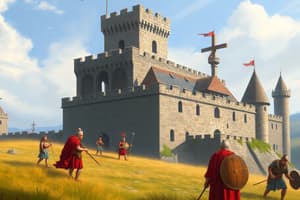Podcast
Questions and Answers
Which of the following was NOT one of the seven main Anglo-Saxon Kingdoms established by 600 AD?
Which of the following was NOT one of the seven main Anglo-Saxon Kingdoms established by 600 AD?
- Wessex
- Scotland (correct)
- Northumbria
- Mercia
What aspect of life in Anglo-Saxon Britain was most influenced by the Romans?
What aspect of life in Anglo-Saxon Britain was most influenced by the Romans?
- Local dialects
- Clan organization
- Infrastructure (correct)
- Social hierarchy
Which cultural contribution emerged from the Anglo-Saxons and remains significant today?
Which cultural contribution emerged from the Anglo-Saxons and remains significant today?
- Roots of English identity (correct)
- Warfare strategies
- Religious practices
- Architectural styles
Which statement best reflects a misconception about Viking helmets?
Which statement best reflects a misconception about Viking helmets?
What was one of the primary impacts of the Romans on British culture?
What was one of the primary impacts of the Romans on British culture?
In what way did the Anglo-Saxon tribes influence the social structure of Britain?
In what way did the Anglo-Saxon tribes influence the social structure of Britain?
Which statement correctly describes the legacy of the Celts in British culture?
Which statement correctly describes the legacy of the Celts in British culture?
Which of the following accurately describes the nature of Viking society?
Which of the following accurately describes the nature of Viking society?
Which of the following kingdoms is correctly matched with its geographical location?
Which of the following kingdoms is correctly matched with its geographical location?
How did the Anglo-Saxon invasion affect the Britons by the year 600 AD?
How did the Anglo-Saxon invasion affect the Britons by the year 600 AD?
What significant trade influence did the Vikings have on Europe?
What significant trade influence did the Vikings have on Europe?
Which of the following is NOT a characteristic of Viking society?
Which of the following is NOT a characteristic of Viking society?
Where is the archaeological site that provides evidence of Viking presence in North America?
Where is the archaeological site that provides evidence of Viking presence in North America?
What was the Viking raid on the Holy Island of Lindisfarne in 793 primarily about?
What was the Viking raid on the Holy Island of Lindisfarne in 793 primarily about?
Which statement regarding Viking religion is correct?
Which statement regarding Viking religion is correct?
What role did the Vikings commonly play in their societies aside from being raiders?
What role did the Vikings commonly play in their societies aside from being raiders?
What is one of the misconceptions about Viking exploration?
What is one of the misconceptions about Viking exploration?
How did the geographical reach of the Vikings affect European trade?
How did the geographical reach of the Vikings affect European trade?
Which city did the Vikings found as part of their expansion?
Which city did the Vikings found as part of their expansion?
Flashcards
Anglo-Saxon Invasion of Britain
Anglo-Saxon Invasion of Britain
The period from 407 to 600 AD when Angles, Saxons, and Jutes migrated to Britain and established Anglo-Saxon kingdoms, ultimately driving out or conquering the native Britons.
Anglo-Saxon Heptarchy
Anglo-Saxon Heptarchy
The seven main Anglo-Saxon kingdoms that arose in Britain by the year 600 AD, each with its own king.
Viking Age
Viking Age
The period from the 8th to the 11th centuries when Vikings (Scandinavians) launched raids and settlements on Anglo-Saxon England.
Horned Viking Helmets
Horned Viking Helmets
Signup and view all the flashcards
Celtic Social Structure
Celtic Social Structure
Signup and view all the flashcards
Roman Legacy in Britain
Roman Legacy in Britain
Signup and view all the flashcards
Anglo-Saxon Language
Anglo-Saxon Language
Signup and view all the flashcards
Anglo-Saxon Kingdoms
Anglo-Saxon Kingdoms
Signup and view all the flashcards
Anglo-Saxon Social Systems
Anglo-Saxon Social Systems
Signup and view all the flashcards
Anglo-Saxon Legacy
Anglo-Saxon Legacy
Signup and view all the flashcards
Were the Vikings just warriors?
Were the Vikings just warriors?
Signup and view all the flashcards
Were Vikings limited to Northern Europe?
Were Vikings limited to Northern Europe?
Signup and view all the flashcards
Were the Vikings godless?
Were the Vikings godless?
Signup and view all the flashcards
What was the significant event of 793 AD?
What was the significant event of 793 AD?
Signup and view all the flashcards
What were the Viking ships known for?
What were the Viking ships known for?
Signup and view all the flashcards
What was the main motive behind the Lindisfarne raid?
What was the main motive behind the Lindisfarne raid?
Signup and view all the flashcards
What was the consequence of the Lindisfarne raid?
What was the consequence of the Lindisfarne raid?
Signup and view all the flashcards
Why are Viking's raids on Anglo-Saxon England significant?
Why are Viking's raids on Anglo-Saxon England significant?
Signup and view all the flashcards
What challenges did Anglo-Saxon kingdoms face during the Viking raids?
What challenges did Anglo-Saxon kingdoms face during the Viking raids?
Signup and view all the flashcards
How did the Anglo-Saxons adapt to the Viking raids?
How did the Anglo-Saxons adapt to the Viking raids?
Signup and view all the flashcards
Study Notes
Anglo-Saxon England (6th-11th Centuries)
- Anglo-Saxons (Jutes, Angles, Saxons) displaced Britons by 600 AD, dividing Britain into seven kingdoms: Northumbria, Mercia, Essex, East Anglia, Wessex, Kent, and Sussex.
Anglo-Saxon Legacy
- Celts: Influenced place names, dialects, and social structure (clan-based). Established early British identity, traditions, and folklore.
- Romans: Introduced infrastructure (roads, towns, forts), governance (laws, administration), and religion (Christianity). Left lasting architectural influence (e.g., Hadrian's Wall) and established early urban centers. Developed British legal and governmental concepts.
- Anglo-Saxons: Created the foundation for the English language; established regional governance; influenced social hierarchy and feudal systems; formed early medieval British culture and institutions; and laid the groundwork for English identity.
The Viking Age
- Repeated Viking attacks on Anglo-Saxon kingdoms from the 8th to the 11th centuries, impacting Anglo-Saxon history.
Viking Myths Debunked
- Horned helmets: No archaeological evidence supports this myth; Viking helmets were simple iron constructions for protection.
- Barbarians: Vikings were more than just raiders; they were also merchants, craftsmen, and farmers. They founded cities (e.g., Dublin), established extensive trade routes, and had laws, artistic traditions, and rich mythology.
- Explorers: Vikings were skilled navigators and merchants. They colonized parts of England, Iceland, and Greenland; reached North America; and significantly influenced European trade by shifting the routes from the south to the north.
- Pagans: Viking religion was complex and structured, not ignorant or godless.
Anglo-Saxons Facing Vikings
- Viking raids began in 793 AD with the attack on Lindisfarne Monastery in Northumbria. Vikings arrived by sea, targeting monasteries, and pillaging treasures. Anglo-Saxon England faced continual Viking attacks, requiring organized defense.
Studying That Suits You
Use AI to generate personalized quizzes and flashcards to suit your learning preferences.




